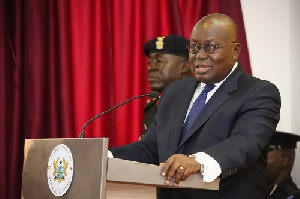- Home - News
- TWI News | TV
- Polls
- Year In Review
- News Archive
- Crime & Punishment
- Politics
- Regional
- Editorial
- Health
- Ghanaians Abroad
- Tabloid
- Africa
- Religion
- Election 2020
- Coronavirus
- News Videos | TV
- Photo Archives
- News Headlines
- Press Release
Opinions of Friday, 17 March 2017
Columnist: Taxpayers’ Alliance Ghana
Post budget statement by Taxpayers Alliance Ghana
For Immediate Release:
Post Budget Statement by Taxpayers’ Alliance Ghana
“Sowing the Seeds for Growth and Jobs” with Tax Cuts: Implications for the Economy.
Ghanaians of all walks of life waited with bated breath for the maiden budget of the barely three months old Nana Akuffo Addo led NPP government. The expectations had been particularly high considering the lofty promises and ideas the NPP sold to Ghanaians on the run up to the 2016 general elections. The Finance Minister, Mr. Ken Ofori-Atta, duly presented the budget statement to the nation through Parliament as the constitution mandates – he christened it the “Asempa Budget” to wit “Good news” Budget. To determine whether the budget as delivered meets the expectations of Ghanaians and is indeed a good news budget as proclaimed by the Finance Minister, one must relate what is contained in the statement with what is captured in the governing party’s manifesto vis a vis the state of the economy as bequeathed by the erstwhile John Mahama led NDC government.
A cursory glance at the budget reveals an interesting, yet promising tale of tax cuts on the one hand, and revenue mobilization on the other hand. While it may be justified to applaud the President, the Finance Minister, and the government at large for such bold steps, it is critical for us to examine the short, medium, and long term implications of the budget and economic policy of the government.
Even though the budget touched on various aspects of the economy, Taxpayers’ Alliance, Ghana, will in the immediate focus on the specific question of taxation and revenue generation or mobilization.
What the NPP Manifesto says about Taxes and Revenue Generation:
In the NPP 2016 Manifesto, they argued that taxes on businesses had increased dramatically and new taxes had also been introduced. For example, they refer to increases in capital gains tax from 10% to 25%, withholding tax from 15% to 20%, and the introduction of the 10% Energy Sector Levy, 17.5% VAT on Electricity. Additionally, they mentioned the VAT on Financial Services (17.5%), and the Special Import Levy as well as the Taxes on ambulances and bicycles.
From the foregoing, the NPP pledged to shift the focus of economic policy away from taxation to production by reducing the corporate tax rate from 25% to 20%; removing import duties on raw materials and machinery for production within the context of the ECOWAS Common External Tariff (CET) Protocol; abolishing the Special Import Levy; abolishing the 17.5% VAT on imported medicines not produced in the country; abolishing the 17.5% VAT on Financial Services; abolishing the 5% VAT on Real Estate sales; abolishing the 17.5% VAT on domestic airline tickets; reducing VAT for micro and small enterprises from the current 17.5% to the 3% Flat Rate VAT introduced by the Kufuor-led NPP government; introducing tax credits and other incentives for businesses that hire young graduates from tertiary institutions, and reviewing withholding taxes imposed on various sectors (including the mining sector) that have constrained the liquidity of many businesses
In their considered opinion, the ensuing increase in production and economic growth which will arise from a streamlining as well as the elimination and reduction of some of these taxes, will be enough to compensate for any temporary shortfall in revenue – against this, they expected growth to increase to double digits starting 2017. They were confident of achieving this due to what they were able to achieve under President Kufuor during the NPP tenure between 2001 and 2008 when corporate taxes were slashed from 32% to 25% resulting in an increase in tax revenue.
According to them, notwithstanding the high level of taxes imposed by the NDC, there was revenue shortfall of GH¢700 million for the first half of 2016.
Additional sources of revenue were therefore proposed to create the necessary fiscal space to finance the shortfall these tax reductions and abolitions will create. Among other things, they put forward the following measures;
• broadening of the tax base as a result of formalization of the economy increase in tax compliance,
• reduced government expenditure as a result of increased collaboration with the private sector and prioritization of government expenditure,
• savings from the reduction of interest rates paid on the country’s debt stock,
• increase in oil and gas revenues from TEN and SANKOFA fields
• elimination of corruption, especially in procurement of goods and services, which is estimated at about 1.5% of GDP annually, and,
• plugging leakages in the administration of public finances. The Auditor General’s Report has indicated that between 2012 and 2014, GH¢5.9 billion of government funds cannot be accounted for. Collectively, these measures will more than exceed any revenue shortfall from the reduction in taxes.
What is in the “Asempa” Budget?
True to their words and promises, the Finance Minister, on behalf of the President, has boldly outlined to the good people of this country what the government hopes to do in respect of Taxes and Revenue Generation in line with their Manifesto promises. As many as 11 taxes have been abolished out rightly, and 3 of them reviewed downward. They include;
Abolished:
• 1 percent Special Import Levy;
• 17.5 percent VAT/NHIL on financial services;
• 17.5 percent VAT/NHIL on selected imported medicines, that are not produced locally;
• Initiate steps to remove import duties on raw materials and machinery for production within the context of the ECOWAS Common External Tariff (CET) Protocol;
• 17.5 percent VAT/NHIL on domestic airline tickets;
• 5 percent VAT/NHIL on Real Estate sales;
• Excise duty on petroleum;
• Special petroleum tax rate from 17.5 percent to 15 percent;
• Duty on the importation of spare parts;
• Levies imposed on kayayei by local authorities;
• Taxes on gains from realization of securities listed on the Ghana Stock Exchange or publicly held securities approved by the Securities and Exchange Commission (SEC).
Reviewed:
• Reduce National Electrification Scheme Levy from 5 percent to 3 percent;
• Reduce Public Lighting Levy from 5 percent to 2 percent;
• Replace the 17.5 VAT/NHIL rate with a flat rate of 3 percent for traders; and Implement tax credits and other incentives for businesses that hire young graduates.
An analysis of the above shows clearly that the government intends to carry out all its campaign promises related to taxes. However, the energy sector levies have not been abolished or reviewed though the Minister promised some form of consolidation to ensure efficiency.
On the revenue side, government estimates total Revenue and Grants, including programmed receipts from petroleum for the 2017 fiscal year to stand at GH¢44,961.6 million, equivalent to 22.1 percent of GDP, indicating a 33.5 percent increase over the provisional outturn in 2016. Total non-petroleum Revenue and Grants is estimated at GH¢42,603.5 million, equivalent to 21.4 percent of non-oil GDP, representing 29.2 percent increase over the provisional outturn in 2016. This is in view of the fact that government’s total expenditure is expected to hit GH¢58,137.4 million, equivalent to 28.6 percent of GDP. This estimated expenditure represents a 13.7 percent increase over the provisional outturn in 2016. Albeit, GH¢3,742.6 million of this amount, equivalent to 1.8 percent of GDP and 6.4 percent of total expenditure will be used for the clearance of arrears.
What this means is that government is going to spend GH¢9 million more than the NDC did in 2016 with an estimated budget overrun of about GH¢13 million.
Per the government’s projections, commodity prices, especially, crude and cocoa are expected to go up while gold will see a decline. The favourable prices of crude and cocoa may well offer a lot of fiscal space for government to operate. However, the uncertainties that usually characterize the global market makes it highly unrealistic to use commodity prices, particularly, crude as a benchmark for fiscal policy.
On growth, the Minister’s projected 6.3 percent GDP growth for 2017, do not meet the double digit growth rate promised in the Manifesto. This clearly constitutes a failure on the part of the government to fulfil its campaign promise. While this may not be fatal considering the shrunken fiscal space, it is important that Ghanaians and Civil Society to demand some answers and assurances from the Minister of Finance.
Implications of the “Asempa” Budget:
While it is generally accepted that tax reliefs or cuts is an expansionary fiscal policy which normally help to increase aggregate demand as households and businesses will be left with more income to spend and invest leading to increased economic activity, productivity, and employment, there are a number of grey areas and concerns to watch.
The NPP in its 2016 Manifesto pledged to reduce Corporate Tax from 25% to 20%, however, the budget statement was silent on that. We will urge the Minister of Finance to provide some clarity on the matter.
Another area to watch is revenue generation – it is obvious that the abolition and downward review of these taxes will lead to a revenue shortfall. It remains to be seen whether government will be able to widen the tax net in order to get more people into the tax bracket as promised in the Manifesto and reiterated by the Minister in the budget statement. According to estimates in the budget, and confirmed by Price Waterhouse Coopers, government will record about GHC5.4 billion revenue shortfall as a result of the tax cuts and reviews. We understand government intends to review the various tax exemptions granted to companies and importers to make up for the shortfall. Our worry as Taxpayers is that such a move may negatively affect Foreign Direct Investment (FDI), especially, those within the Free zones enclave. We will like to know the measures that government will put in place to sustain investor confidence with the view of increasing productivity and job creation.
Of major concern to taxpayers, is the size of government. We have observed with worry how the size of the executive has ballooned to unprecedented levels under the new administration; this is happening at a time government is already struggling to deal with the huge public sector wage bill – the large size of government means an additional burden on the taxpayer.
Again, per the Minister’s own submission, we spent a chunk of our already over stretched tax revenue on interest payments and amortization, public sector wages and salaries, and statutory funds. What is the assurance that with the proposed cuts, we will have enough revenue streams to take care of these items? The biggest contradiction to resolve, however, is how to continue to fund capital expenditure in the face of these tax cuts and reviews. What are the implications for government’s major programmes like: Free SHS; one district, one factory; one village, one dam; 1 million GHC per constituency, e.t.c? Considering the fact that the NPP while in opposition criticized the NDC for what they called reckless borrowing, will they have the political will and moral right to borrow to make up for the revenue shortfall in order to finance the deficit as well as infrastructural projects? We are aware of government’s intentions to borrow from the domestic market and the BoG to finance the budget deficit of GHC13.17 billion; indeed, Government has already raised a total of GHC1.01 billion three-year domestic bond issued at a yield of 21.5 percent. What does this mean for Treasury Bill Rates, inflation, and the debt stock? Treasury bill rates will go up, therefore attracting more banks to invest in GoG instruments leading to a crowding out of local businesses – this will certainly have an adverse effect on job creation.
We are also greatly concerned about the GHC1.5 billion that has been allocated to the presidency. Even though we acknowledge the explanation from Hon. Kwaku Kwarteng, Deputy Minister designate for Finance, that about one billion of the 1.5 billion is going to be used for several of the government’s special projects announced in the budget statement, we will call for further assurances from the Presidency that every cedi will be used for the purpose for which it was allocated. This call is particularly legitimate in view of the lack of transparency and accountability that characterized expenditure related to the Office of the President in the previous administration.
Finally, the budget was silent on public sector corruption and waste – the government loses millions of cedis annually through corruption and wastage in the system; according to conservative estimates made by OccupyGhana based on the Auditor-General’s own reports to Parliament, from 2003 to 2014 (excluding 2009), Ghana lost almost GHC2.5billion through Ministries, Departments and Agencies alone. And between 2009 and 2014, amounts lost to Ghana through public boards, corporations and other statutory institutions were over GHC5 billion. In total, we are looking at a whooping GHC7.5 billion cedis over 11 years. It is our view that government must take urgent steps to block all the loopholes so that some reasonable savings can be made to cater for the revenue shortfall.
Overall, we belief that a low tax regime is the way to go but we need to get the matrix right in order not to create dislocations in our fiscal space. We will be keenly monitoring how government will deal with the unavoidable challenges which will result from the bold decisions captured in the budget.
Signed:
Boniface A. Sutinga
Deputy Executive Director
(Taxpayers’ Alliance Ghana)
Contact: 0242824006
Cc: All Media Houses











